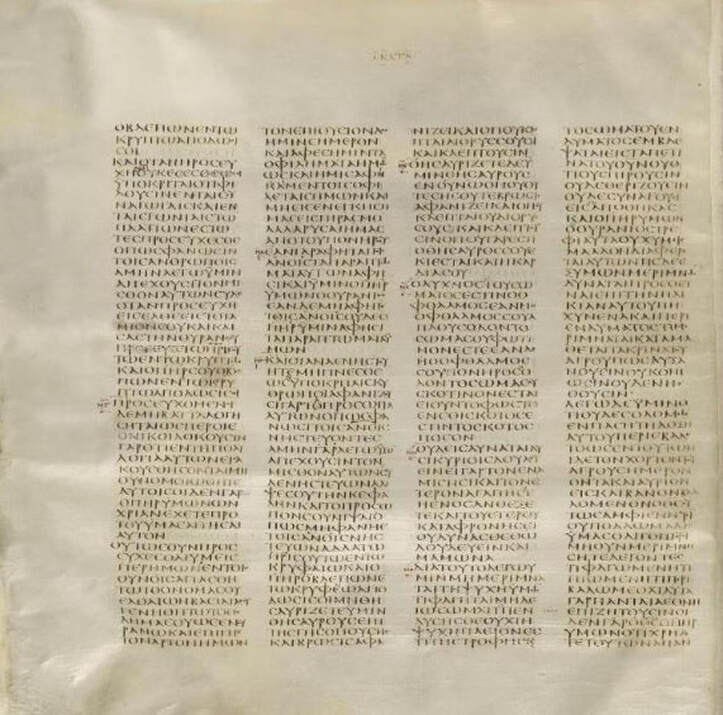The Codex Sinaiticus
Listed below are the books and passages that are contained in Codex Sinaiticus. It includes portions of the Old Testament, the entire New Testament and some Aprocryphal books.
The text of the Old Testament contains the following passages:[18][19]
Genesis 23:19 – Genesis 24:46 – fragments
Leviticus 20:27 – Leviticus 22:30
Numbers 5:26–Numbers 7:20 – fragments
1 Chronicles 9:27–1 Chronicles 19:17
Ezra–Nehemiah (from Esdr. 9:9).
Book of Psalms–Wisdom of Sirach
Book of Esther
Book of Tobit
Book of Judith
Book of Joel–Book of Malachi
Book of Isaiah
Book of Jeremiah
Book of Lamentations
1 Maccabees–4 Maccabees
John 7:52–8:12 without the pericope 7:53–8:11 in Sinaiticus
The text of the New Testament lacks several passages:[20]
Omitted verses
Gospel of Matthew 12:47, 16:2b-3, 17:21, 18:11, 23:14, 24:35;
Gospel of Mark 1:33, 7:16, 9:44, 9:46, 10:36, 11:26, 15:28, 16:9–20 (Long ending of the Gospel Mark, referring to the appearance of Jesus to many people following the resurrection)
Gospel of Luke 10:32 (Likely omitted due to haplography resulting from homeoteleuton; the verse was added by a later corrector in lower margin.), 17:36
Gospel of John 5:4, Pericope adulterae (7:53–8:11) (see Image "John 7:53–8:11"), 16:15, 19:20, 20:5b-6, 21:25
Acts of the Apostles 8:37; 15:34; 24:7; 28:29;[21]
Epistle to the Romans 16:24
Page of the codex with text of Matthew 6:4–32
Omitted phrases
Matthew 5:44 εὐλογεῖτε τοὺς καταρωμένους ὑμᾶς, καλῶς ποιεῖτε τοῖς μισοῦσιν ὑμᾶς (bless those who curse you, do good to those who hate you);[22]
Matthew 6:13 – ὅτι σοῦ ἐστιν ἡ βασιλεία καὶ ἡ δύναμις καὶ ἡ δόξα εἰς τοὺς αἰῶνας. ἀμήν (For thine is the kingdom, and the power, and the glory, for ever. Amen.) omitted.[23]
Matthew 10:39a – ο ευρων την ψυχην αυτου απολεσει αυτην, και (Ηe who finds his life will lose it, and);[24]
Matthew 15:6 – η την μητερα (αυτου) (or (his) mother);[25]
Matthew 20:23 και το βαπτισμα ο εγω βαπτιζομαι βαπτισθησεσθε (and be baptized with the baptism that I am baptized with)[26]
Matthew 23:35 – υιου βαραχιου (son of Barachi'ah) omitted; this omission is supported only by codex 59 (by the first hand), three Evangelistaria (ℓ 6, ℓ 13, and ℓ 185), and Eusebius.[27]
Mark 1:1 – υιου θεου "the Son of God" omitted.[28]
Mark 10:7 – omitted και προσκολληθησεται προς την γυναικα αυτου (and be joined to his wife), as in codices Codex Vaticanus Graecus 1209, Codex Athous Lavrensis, 892, ℓ 48, syrs, goth.[29]
Luke 9:55b-56a – καὶ εἶπεν, Οὐκ οἴδατε ποίου πνεύματος ἐστὲ ὑμεῖς; ὁ γὰρ υἱὸς τοῦ ἀνθρώπου οὐκ ἦλθεν ψυχὰς ἀνθρώπων ἀπολέσαι ἀλλὰ σῶσαι (and He said: "You do not know what manner of spirit you are of; for the Son of man came not to destroy men's lives but to save them) omitted as in codices: P45, P75, B, C, L, Θ, Ξ, 33, 700, 892, 1241, syr, copbo;[30]
John 4:9 – ου γαρ συνχρωνται Ιουδαιοι Σαμαριταις (Jews have no dealings with Samaritans), it is one of so-called Western non-interpolations; omission is supported by D, a, b, d, e, j, copfay, it was supplemented by the first corrector (before leaving scriptorium);[31]
Some passages were excluded by the correctors:
Additional phrase to John 21:6 on the margin – οι δε ειπον δι οληϲ τηϲ νυκτοϲ εκοπιαϲαμεν και ουδεν ελαβομεν επι δε τω ϲω ρηματι βαλουμεν
Matthew 24:36 – phrase ουδε ο υιος (nor the Son) the first corrector marked as doubtful, but the second corrector (b) removed the mark.[32]
Mark 10:40 ητοιμασται υπο του πατρος μου (instead of ητοιμασται) – the first corrector marked "υπο του πατρος μου" as doubtful, but the second corrector removed the mark.[33]
In Luke 11:4 ἀλλὰ ῥῦσαι ἡμᾶς ἀπὸ τοῦ πονηροῦ (but deliver us from evil) included by the original scribe, marked by the first corrector (a) as doubtful, but the third corrector (c) removed the mark.[34]
Christ's agony at Gethsemane (Luke 22:43–44) – included by the original scribe, marked by the first corrector as doubtful, but the third corrector (c) removed the mark.[35]
Luke 23:34a, "Then said Jesus, Father, forgive them; for they know not what they do" – it was included by the first scribe, marked by the first corrector as doubtful, but a third corrector removed the mark.[36]

